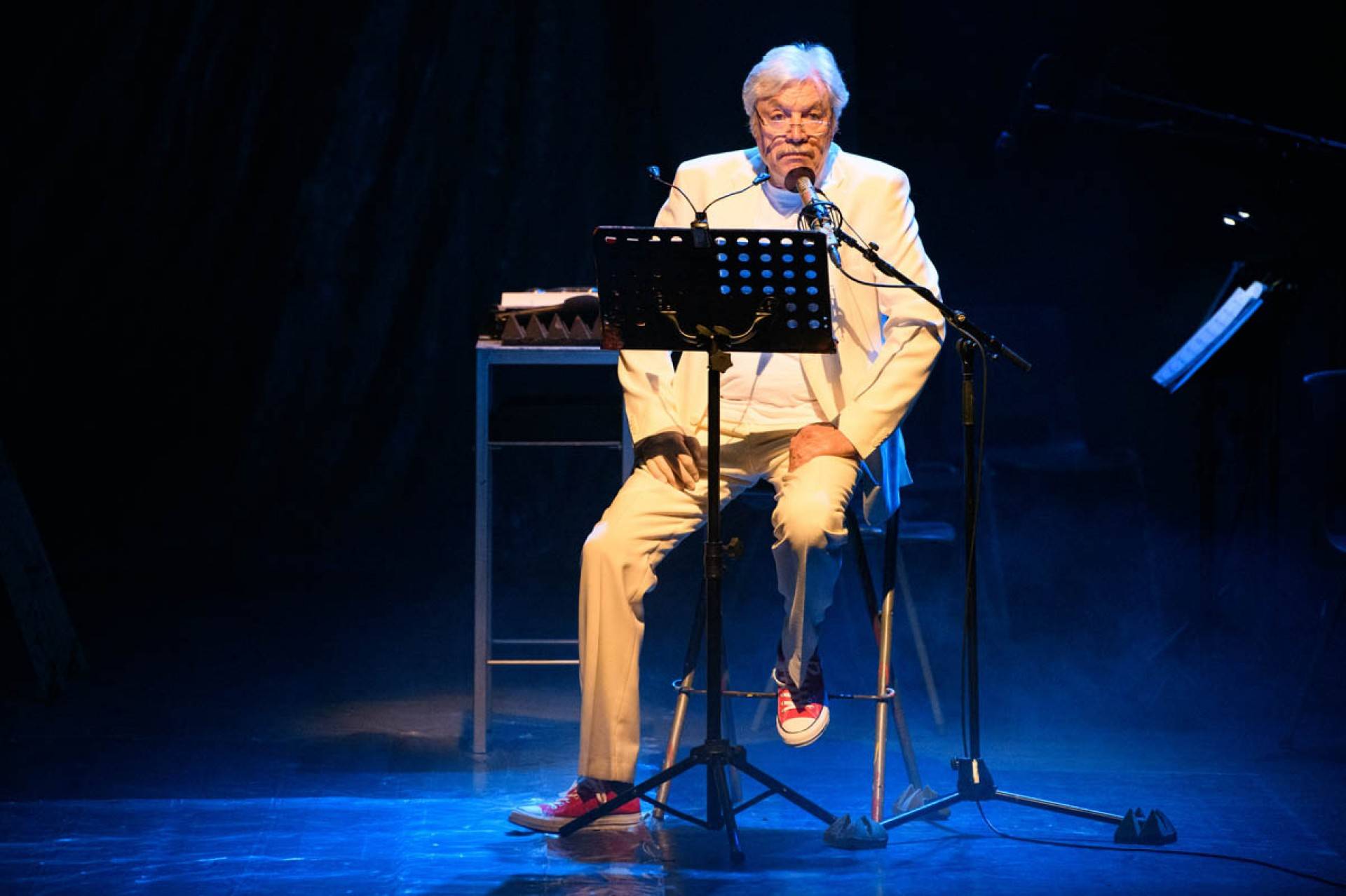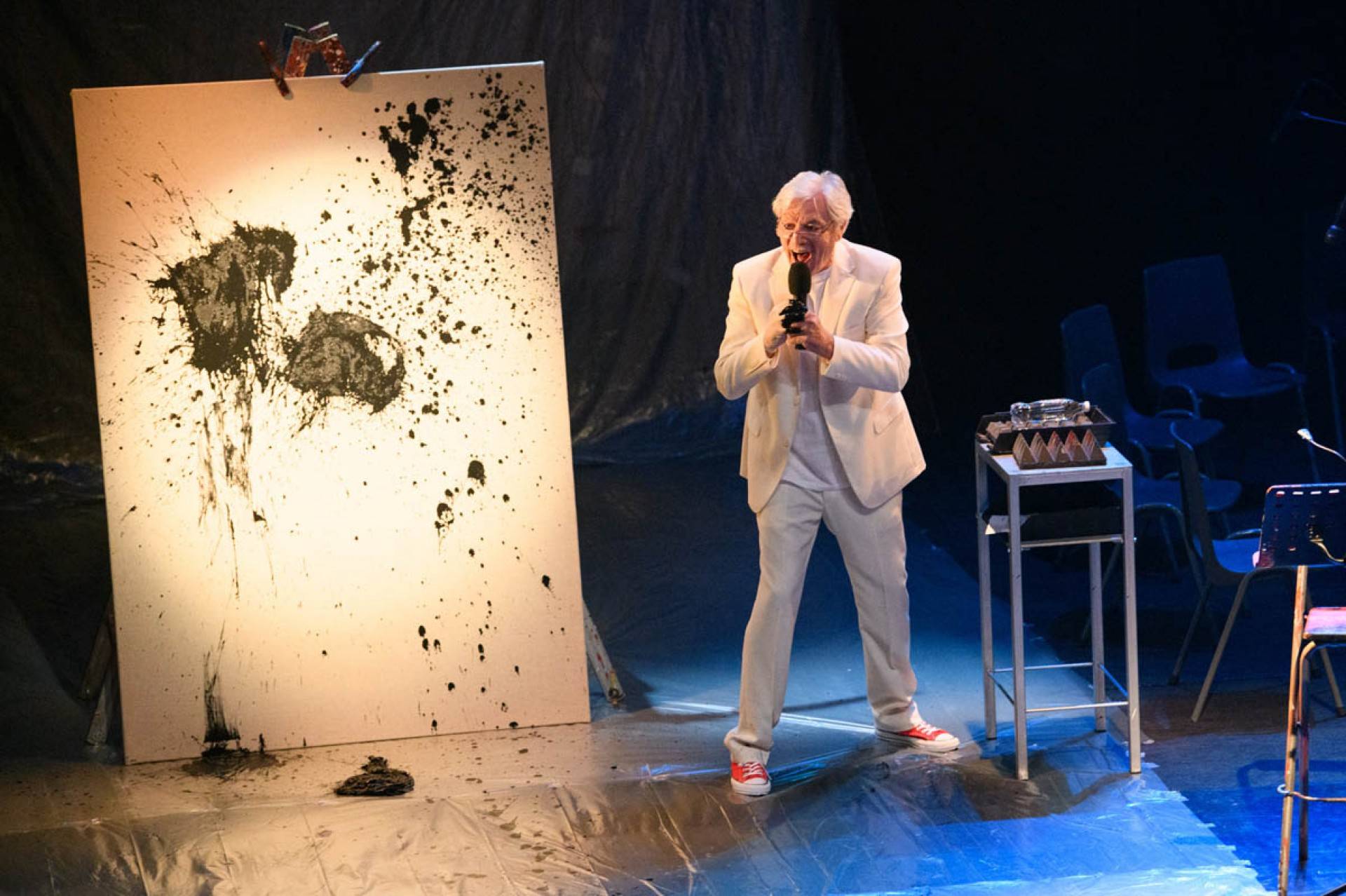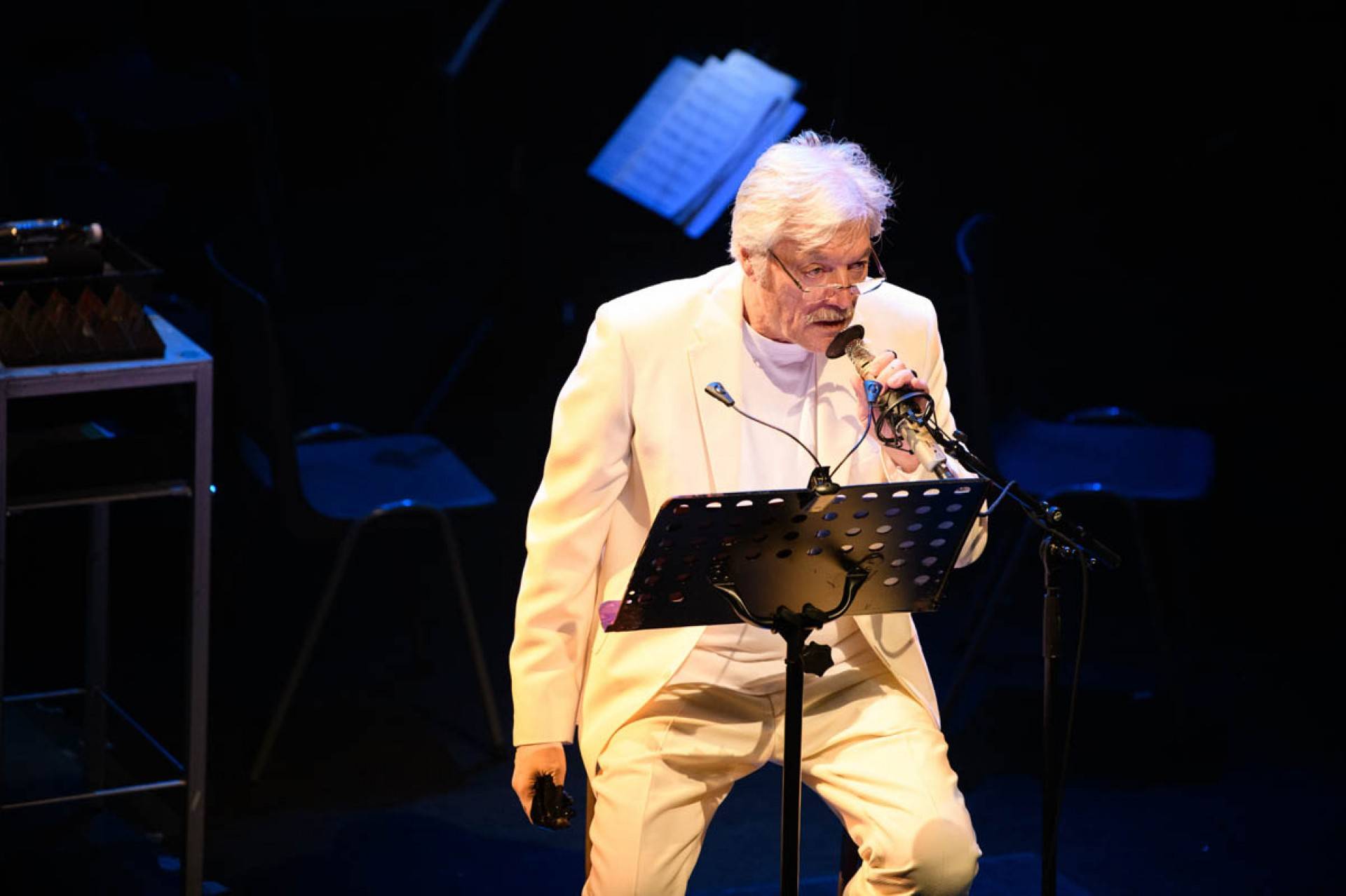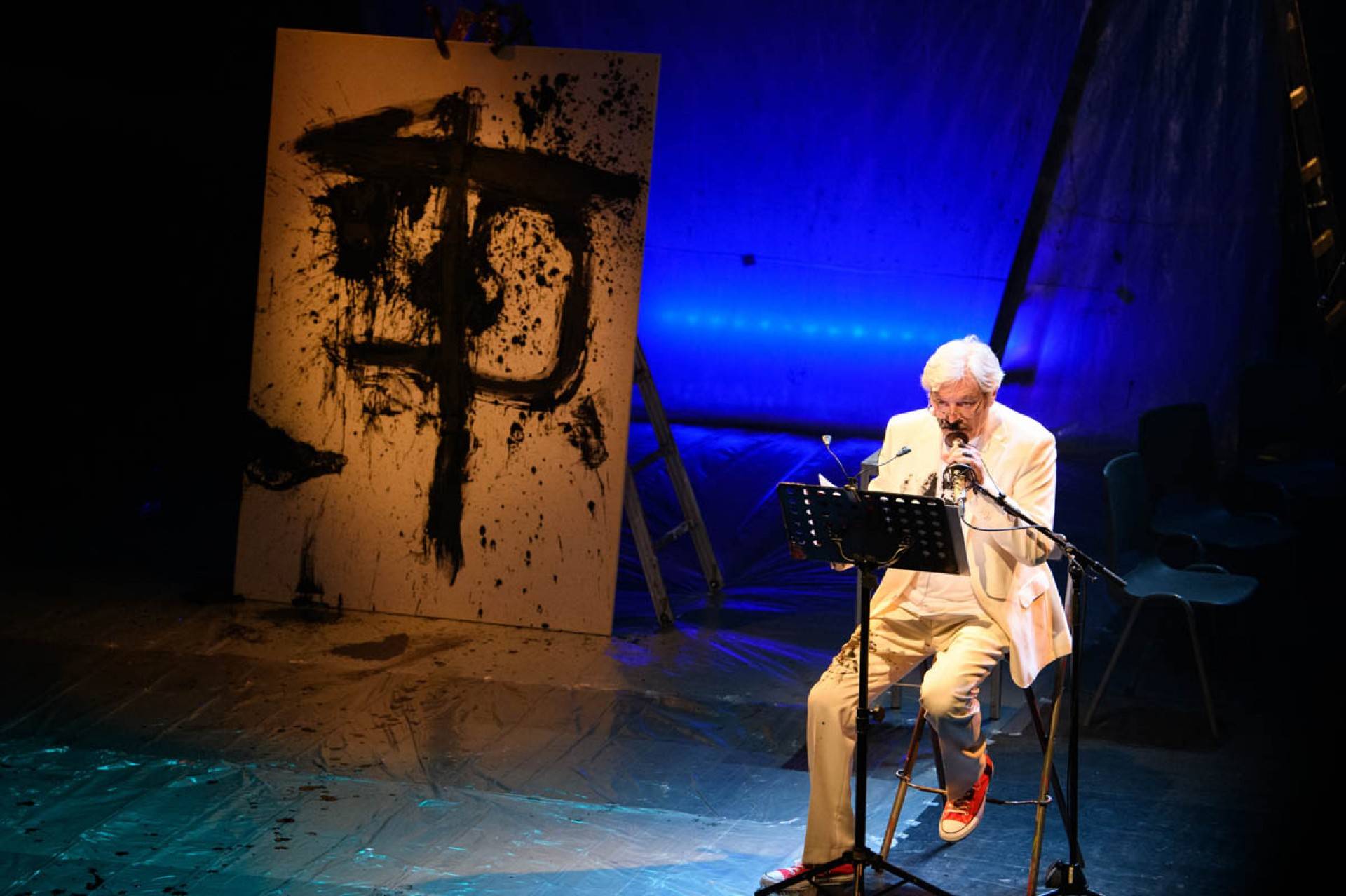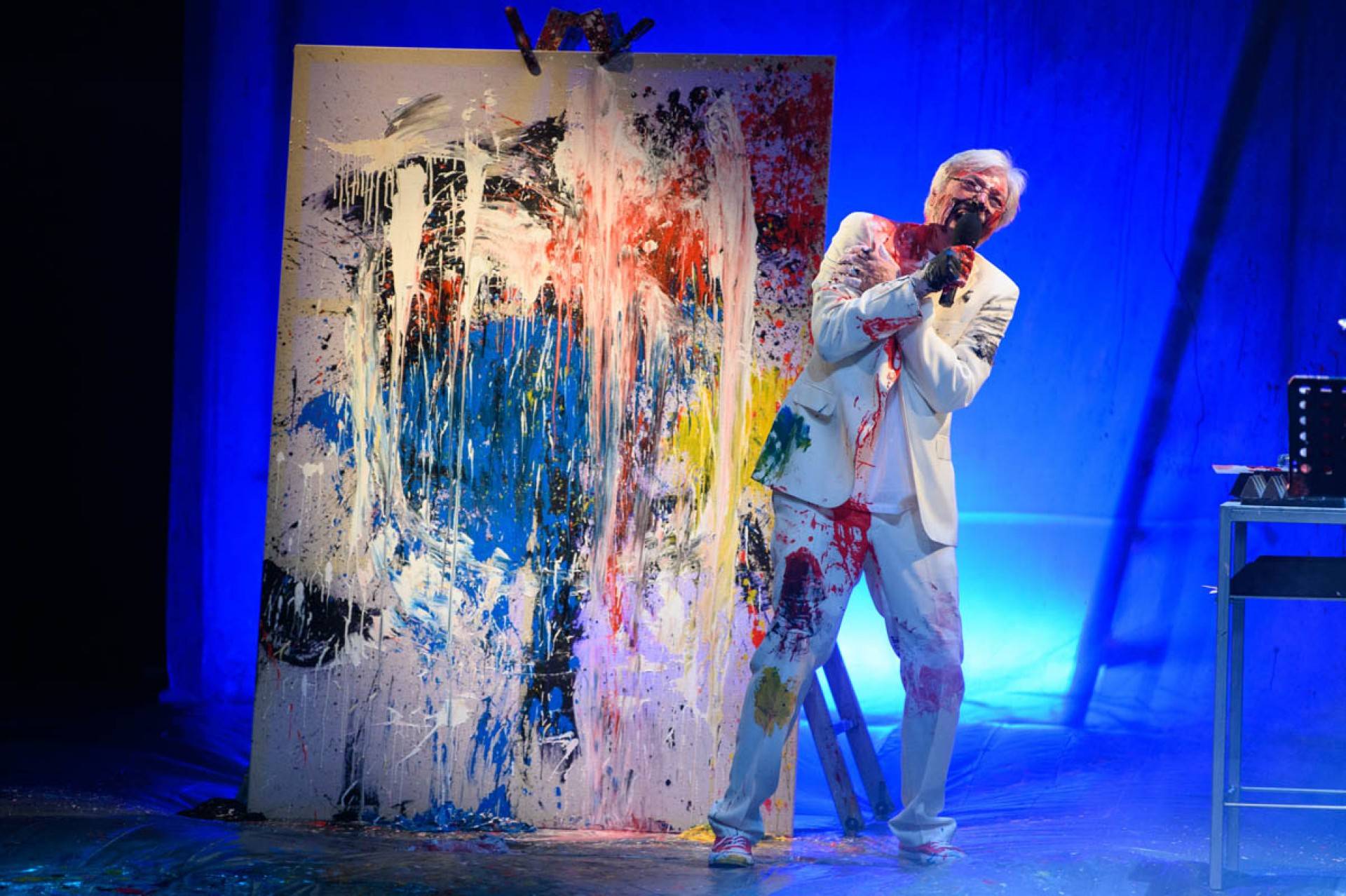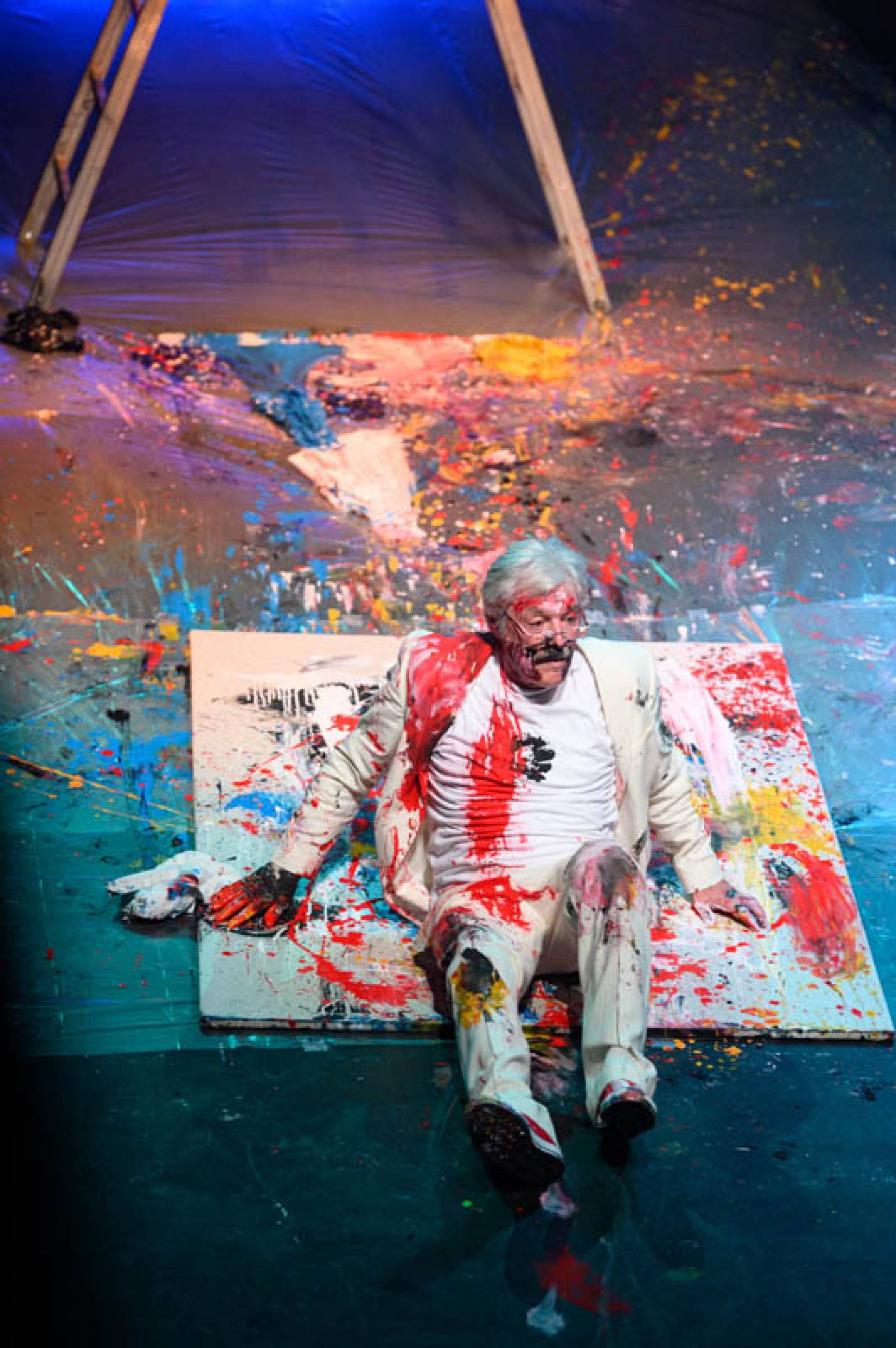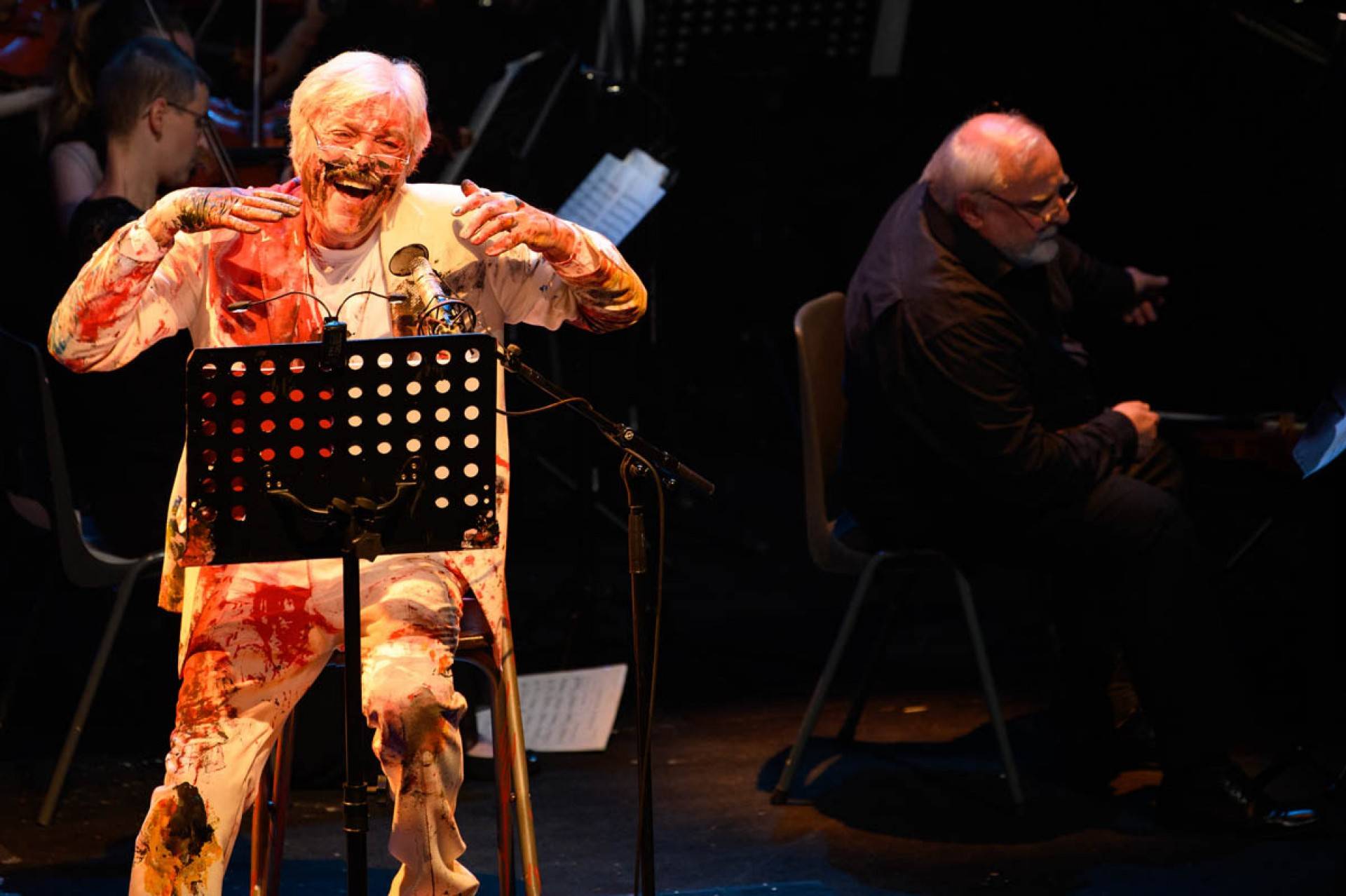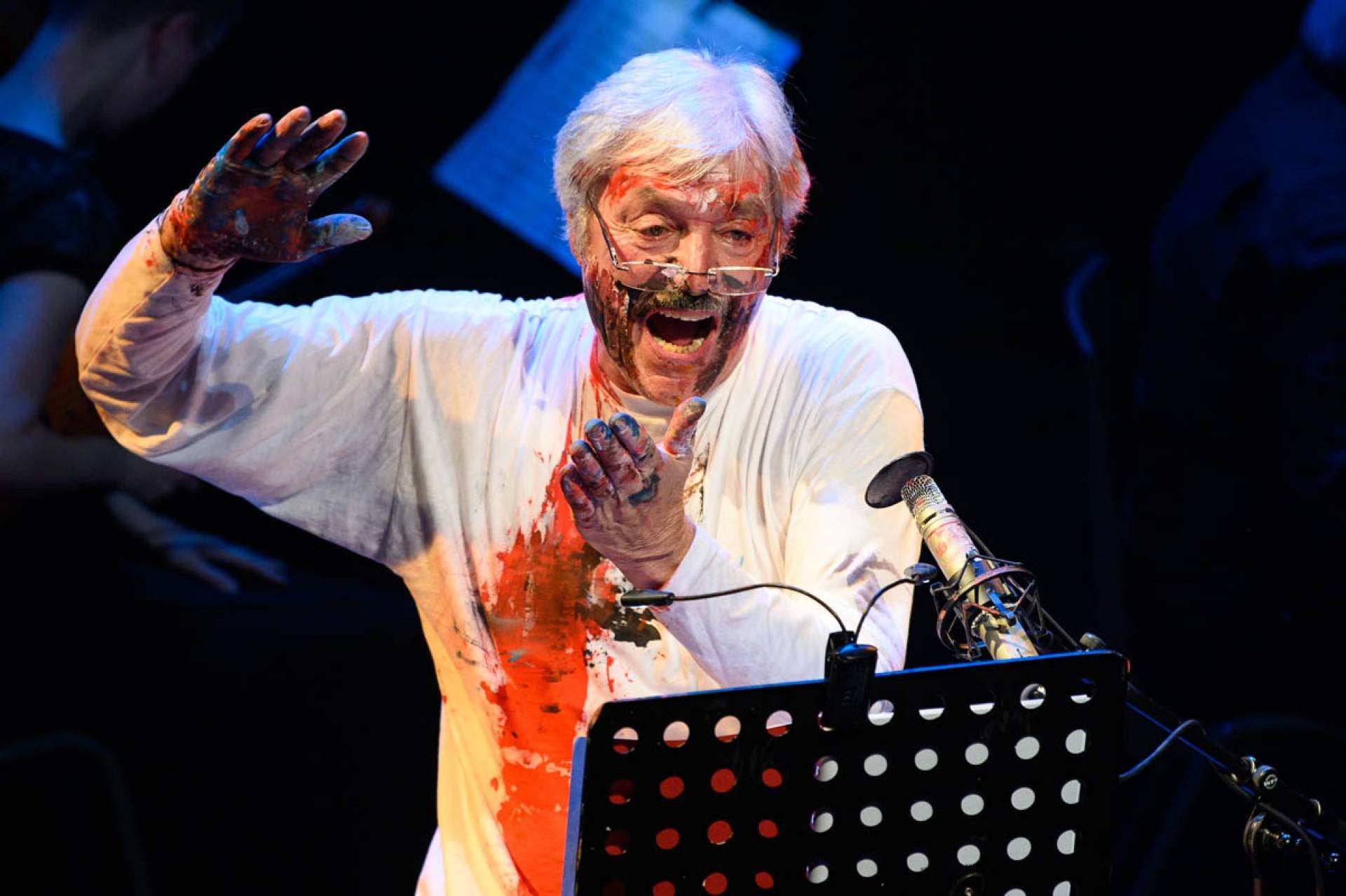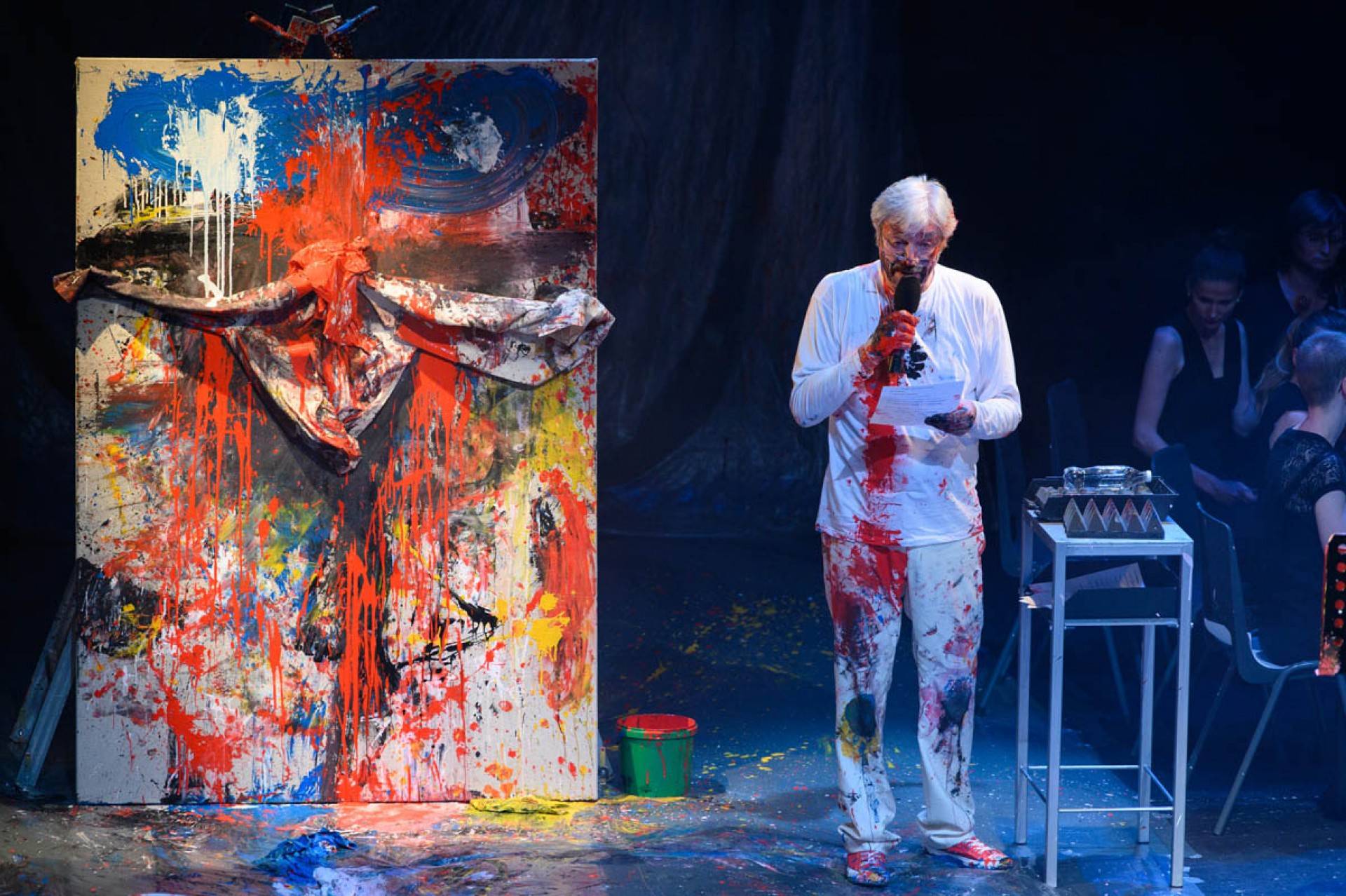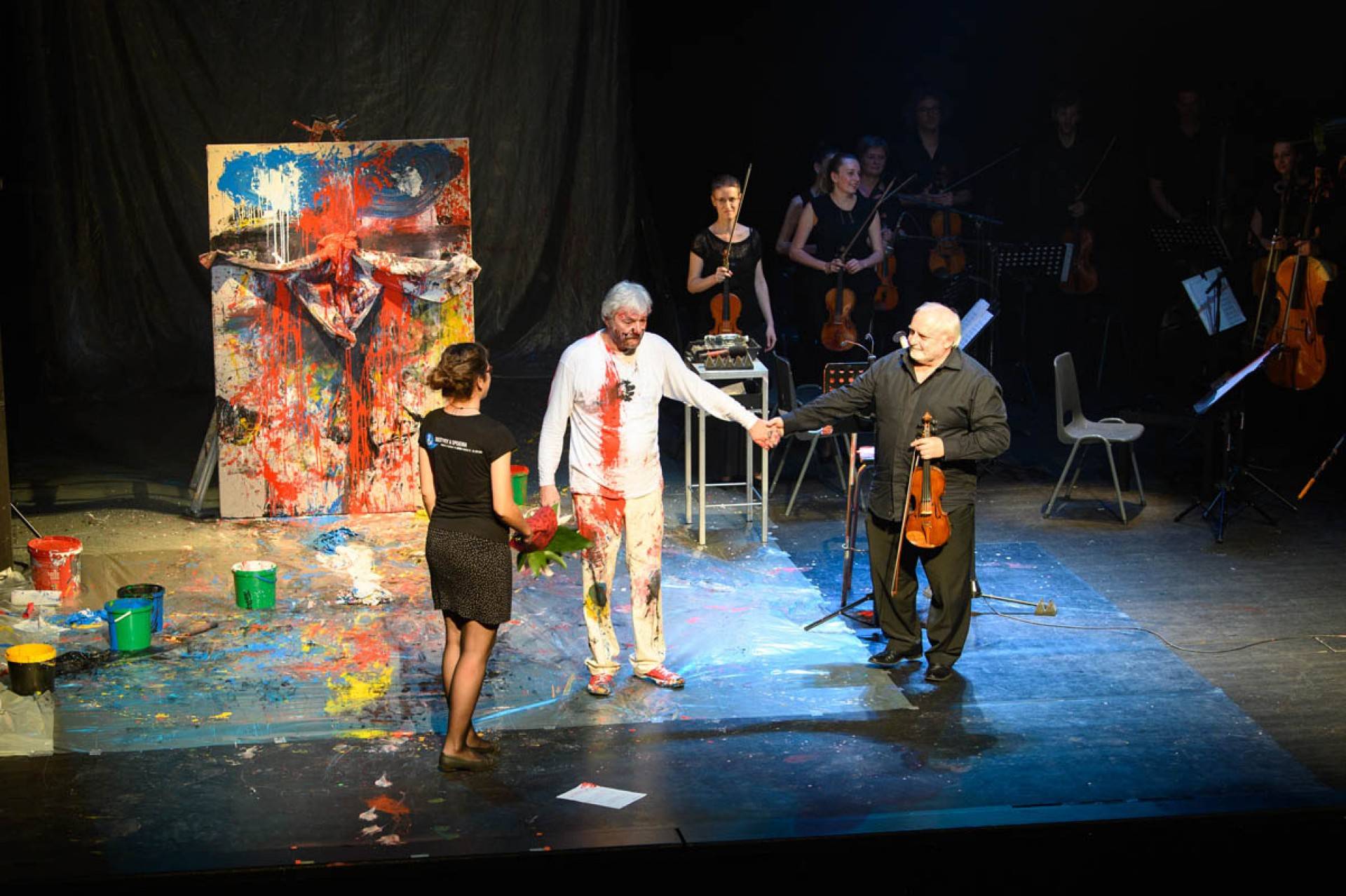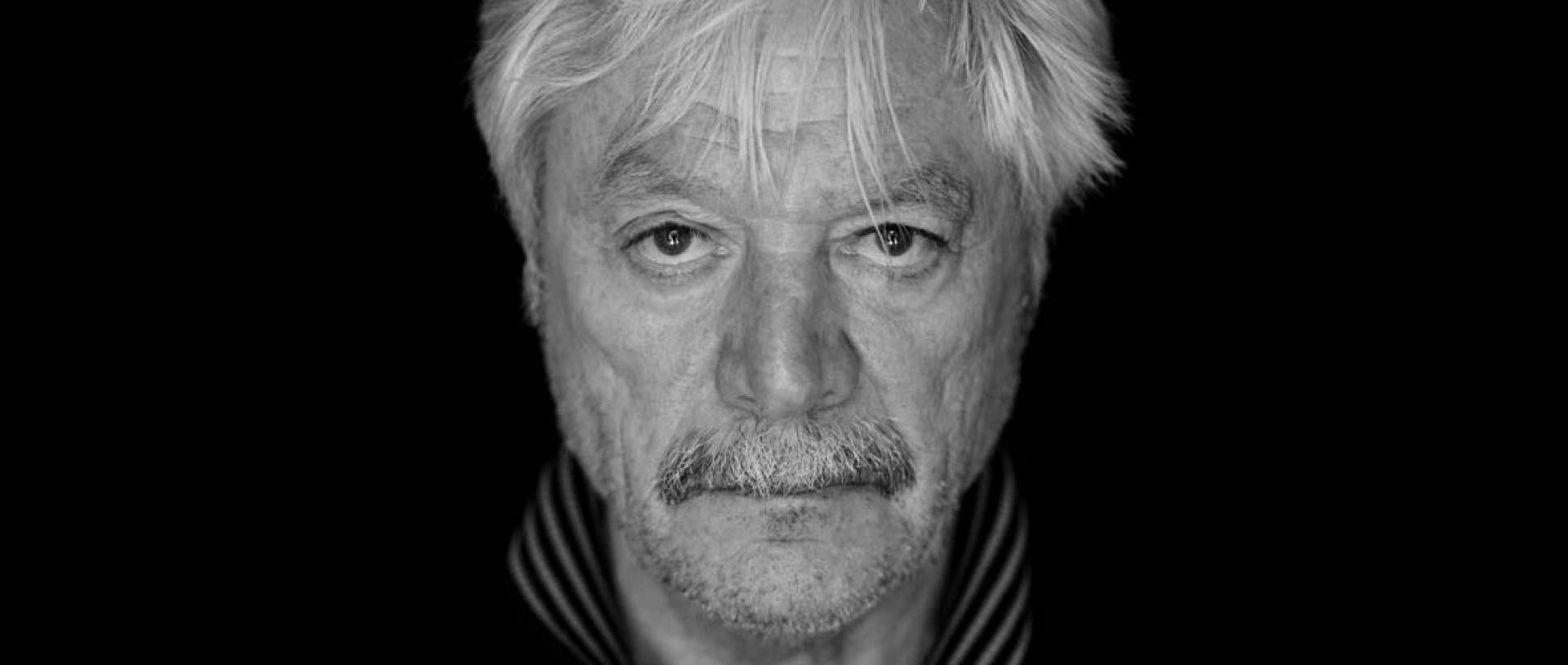

The current exhibition of the paintings by actor Juraj Kukura features unique interpretations of selected stories from the Bible created during individual performances of BIBLIA/THE BIBLE at the Aréna Theater. In March 2019, the play Biblia (The Bible) was premiered and due to its great suc-cess, it was also presented at the Dotyky a spojenia Festival and the Divadelná Nitra International Theater Festival.
BIBLIA/THE BIBLE - a stage reading of Biblical stories and a musical-theatrical and visual-performance by actor Juraj Kukura and directed by Rastislav Ballek, was created in cooperation with the Slovak Philharmonic Orchestra. It has become another part of the Aréna’s Theater’s Civic Cycle.
This unique cycle is Kukura’s dramaturgical project consisting of topical presentations of our history and interpretations of contemporary themes.
A unique artistic artifact based on Bible stories is created during each performance, before the eyes of the audience; each one is different and its definitive appearance depends not only on the mood of its creator, Juraj Kukura, but also on how the Biblical story took place, and how the stories are transferred to the canvas. His painting expression is extremely dramatic and expressive, as Kukura materializes extremely strong emotional experiences, which he lays in various contrasting color layers. His amazing acting is thus complemented by bold gesture painting.
The Bible, which contains 73 books created in the course of approximately 1,500 years, became the theme for the creation of an exceptional musical-dramatic poem mapping the history of mankind from the creation of the world to the resurrection of Jesus Christ. Selected stories from the Old and New Testament ask timeless questions regarding morals, conscience, faith and power of the spiritual in times when the founding pillars of our European society are drowning in doubt.
The Lives of Abraham, Isaac, Jacob, Moses and the fate of Jesus Christ and his disciples offer para-bles of modern man troubled by a loss of faith, replaced nowadays by consumption. The trials which the current times bring to mankind are no different from those of the Old Testament; betrayal and struggles with oneself are the same as in the New Testament. And Juraj Kukura fights this battle on stage, not only as an exceptional actor, but also as a painter.
JURAJ KUKURA was born on March 15, 1947 in Prešov. He attended elementary and secondary school in Bratislava and entered the world of theater while working at the Film a divadlo (Film and Theater) magazine. He graduated from the Academy of Performing Arts in Bratislava under the guidance of Jozef Budský. However, when he was nineteen years old director Ivan Balaďa selected him to be one of the main characters in the film adaptation of Margita Figuli’s novel, Tri gaštanové kone (Three Chestnut Horses 1966).
In 1970, still as a student, he became a member of the legendary theater group Divadlo na korze. After it dissolved, he moved to the Nová scéna theater and later to the Slovak National Theater. During this time, his cooperation with director Miloš Pietor was extremely important, as he played character roles co-participating in thematic testimony of the following plays and the overall form of Pietor’s poetics: Ďuro Ľavko in the dramatization of Tajovský’s Statky-zmätky (The Estates Are a Mess), Filint in Molière’s The Misanthrope, Astrov in Chekhov’s Uncle Vanya, Pišta Bučák in Tajovský’s Nový život (New Life), the main character in Chekhov’s Platonov, Khlestakov in Gogol’s The Government Inspector and many others.
In addition to performing on stage, Kukura appeared in many television productions where he played the main characters in adaptations of important international and domestic literary works, such as Iago, Oedipus and Eugene Onegin. The TV production of Mario and the Magician, based on the novella by Thomas Mann, and in which Kukura played the main character, was awarded at the Monte Carlo International Television Festival.
Kukura also showcased his acting mastery in film where he excelled in the male roles in masterpieces of Czecho-Slovak and foreign cinematography: Zbehovia a pútnici (Deserters and Pilgrims) directed by Juraj Jakubisko, Eden and After directed by Alain Robbe-Grillet, Koncert pre pozostalých (Concert for the Survivors) directed by Dušan Trančík, Deviate srdce (The Ninth Heart) directed by Juraj Herz, Božská Ema (Divine Emma) directed by Jiří Krejčík and many others.
In 1984, while shooting the film Via Mala abroad, Juraj Kukura was unjustly convicted of deserting the republic, as a result of which he was sentenced in absencia to 3 and a half years of imprisonment and his property was confiscated. Because he could not return home, he was hired by Münchner Kammerspiele in Germany, and later, from 1985 to 1989 by Schauspielhaus Hamburg. He has been a guest actor in many prestigious foreign theaters such as Stadttheater Basel, Theater Bonn, Residenztheater München, and the Divadlo Komedie and Činoherní klub in Prague. He also cooperated with significant German director Peter Zadek and the highly respected Jérôme Savary, in portraying the most distinctive characters of world theater in renowned theater houses together with the giants of global acting such as Eva Mattes, Ilsa Ritter, Mario Adorf, Manfred Krug, Gerhard Voss, Ulrich Tukur and others.
In Germany he also found recognition in film and television productions; he played in the films Otto – Der Liebesfilm, Workaholic, Apokalypse 99 – Anatomie eines Amokläufers ( ), Das Sams and many others, in the TV series Das Erbe der Guldenburgs, Hotel Paradies, Bon Voyage, Clinic under the Palms. He also played the main character in two episodes of the German TV police series Tatort (Crime Scene). In 1989 he appeared in the British Channel 4 TV series Traffic, which was nominated for six BAFTA awards and won four of them, the International Emmy Award for Best Drama. The famous film of the same title was directed by Steven Soderbergh.
After 1989 he gradually returned to Czechoslovak film and TV screens. He played the main character in the film Lepšie byť bohatý a zdravý ako chudobný a chorý (Better to Be Wealthy and Healthy Than Poor and Sick), directed by Juraj Jakubisko, the TV film Cudzinci (Strangers) with actor Jozef Króner, and the main character in the Slovak drama Tábor padlých žien (The Camp of Fallen Women). He also played in Fragmenty z malomesta (Small Town Fragments), and in the original fairy tale film Sokoliar Tomáš (Thomas and the Falcon King). He won the Igric Award at the Art Film Festival at Trenčianske Teplice, Slovakia for the TV film Voľnomyšlienkár (The Freethinker) about Enlightenment scholar Denis Diderot.
From 1966 to 2008 Kukura ACTED IN 30 FEATURE FILMS, 130 TELEVISION FILMS AND PRODUCTIONS AND 37 TELEVISION SERIES at home and abroad.
He won the prestigious Divadelní noviny award for best actor in all theater genres in the 2014/2015 season, for his performance in Bratři Karamazovi (The Brothers Karamazov), directed by Martin Čičvák, at Činoherní klub in Prague. In addition, he was nominated for the annual Thália Award of the Czech Actors’ Association and the 2015 Award of Theater Critics of the Czech Republic by the renowned Czech journal Svět a divadlo (The World and Theater) for his portrayal of Fyodor Karamazov.
Kukura was nominated for Best Actor at the 2011 Monte Carlo International Television Festival for his performance in the film Zrozen bez porodu (Born Without Childbirth).
In 2018 he was the main character in the Slovak Radio and TV and Czech Television co-production series entitled Inšpektor Max (Inspector Max), the first feature series whose broadcast rights were sold in the USA and Canada.
He has been the manager of the Divadlo Aréna (Aréna Theater) in Bratislava since 2002, where he has appeared in productions of Koza alebo Kto je Sylvia (Goat or Who Is Sylvia), Rodinná slávnosť (Family Celebration) and Komunizmus (Communism), all three of which were directed by Martin Čičvák. He won the 2004 Dosky Award for Best Actor for his role in Koza alebo Kto je Sylvia.
The Aréna Theater, built in 1828, is a cultural historical monument of the first class. Nowadays, contemporary and classical drama, opera, musical, dance performances and pop, rock and jazz concerts are produced there. Juraj Kukura created a unique dramaturgical project called the Aréna Theater Civic Cycle, with a outstanding and topical presentations of our history featuring contemporary themes, critical views, modern forms and historical and political contexts. Live opera performances from New York are also screened here.
Kukura also founded Detská Univerzita Komenského (DUK, Children’s Comenius University), which has been attended by approximately 5,000 students in its 17-year history. In recognition of his implementation of the DKU he received the Humanity Council Award (2005), the Orange Foundation Award in the category of long-term contribution to education (2011), and the Gold Medal of Comenius University for his long-term cooperation contributing to the development and good name of the university (2017).
In October 2017, Miloš Zeman, the President of the Czech Republic presented Kukura with the Medal of Merit in the area of arts; he is also the holder of the Bratislava Mayor’s Award (2018), the Brusnianska brusnica prize for his extraordinary contribution to Slovak culture (2017), the Beckovské Slnko Award (2017), the Literary Fund Award for Lifetime Achievement in the field of theater, the 2017 Trebbia International Award, the Award of the Ministry of Education, Science, Research and Sport of the SR, the Osobnosť Petržalky award (2013) and the Samuel Zoch Award for the development of cultural and artistic values (2013).
In March 2019, in cooperation with the Slovak Philharmonic Orchestra, he appeared in the premiere of Biblia (The Bible) – read by Juraj Kukura, which was received with a great success at the Dotyky a spojenia Festival and the Divadelná Nitra International Theater Festival.
After performing at Prague theaters Činoherní klub and Divadlo Komedie he is preparing for the play Vojde kôň do baru (A Horse Walks into a Bar), directed by Martin Čičvák at the Rokoko theater (première: March 2020).
Juraj Kukura lives in Bratislava, Hamburg and Prague. He is married, and has a son Filipa and a granddaughter Ella.
